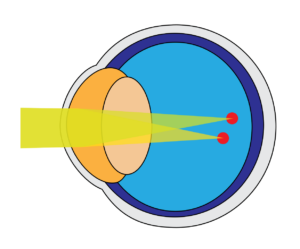
Best Eye Vitamins for Blurry Vision
Blurry vision is a common symptom of vision that just isn’t quite up to snuff. Part of what makes blurry vision so frustrating, though, is that there are many different causes. Some people experience blurry vision every so often when they have a migraine. Others suffer from it more permanently due to issues like cataracts, glaucoma, or macular degeneration.
Whatever the case may be, there is hope if you are experiencing blurry vision. Some may point you toward corrective lenses or even surgery to fix this issue. However, here at Rebuild Your Vision, we are committed to helping you find natural solutions whenever possible. One of the best things about these solutions is that you can implement them before you even experience an issue with your eyes. In fact, many of these options are more effective if you start earlier in life. These five best eye vitamins for blurry vision will help you both heal and protect your eyes naturally.
Vitamin A
Vitamin A has long been heralded as one of the best vision vitamins, and for good reason. This is because vitamin A is essential to retinal health. The retina plays a crucial role in clear vision. It is also the part of the eye most impacted by macular degeneration, which is a leading cause of blurry vision. Vitamin A strengthens the retina by helping to produce rhodopsin, a protein that helps keep vision clear, especially in lower light conditions.
A vitamin A deficiency can cause severe vision disorders – even corneal perforation. A recent article published by the Duke School of Ophthalmology discussed a severely malnourished patient (her diet consisted mostly of crackers, cheese, and lunch meat) who suffered from an extreme case of blurry vision. A few weeks after the researchers first met with her, she was admitted to the hospital with a corneal perforation. After running some tests, the doctors concluded that a vitamin A deficiency was a key player in the corneal perforation, as this vitamin helps build protein in the eye. They treated this patient first by gluing the perforation back together. They then prescribed high doses of vitamin A to correct the deficiency.
This just goes to show how effective and important Vitamin A is to preventing everything from a minor case of blurry vision to major eye issues. It is one of the best supplements to improve eye health.
Vitamin C
We all know that vitamin C is a great immune system booster. But, did you know that it is also one of the best vitamins to improve blurry vision? This is because of vitamin C’s key connection to cataract prevention and treatment.
Cataracts are one of the leading causes of vision issues in the U.S. Researchers estimate that more than 25 million U.S Americans suffer from cataracts. Luckily, vitamin C’s antioxidant properties make it extremely effective in preventing cataracts. Cataracts form when proteins and fibers within the lens of the eye begin to break down, or oxidize. This forms a cloudy film that makes it difficult to see clearly. Antioxidants can prevent this oxidation from happening.
In fact, a recent study published in Nutrients found that vitamin C delayed the onset of cataracts for two years in up to 80% of the patients studied. Adding more vitamin C to your diet is a great way to prevent blurry vision caused by cataracts.
Vitamin E
Vitamin E is perhaps the vitamin on this list that we haven’t heard as much about, perhaps because its functions aren’t as widely publicized as those of vitamins A or C. However, it’s just as prevalent in our diet! It’s found in many eye-healthy foods, including plant-based oils like sunflower oil. It’s also found in nuts like almonds and peanuts, and fruits like mango and kiwi.
When it comes to preventing and improving blurry vision, vitamin E functions much in the same way as vitamin C. It is also a powerful antioxidant critical to the eye’s function at the cellular level by preserving the structure of cell membranes. Like vitamin C, vitamin E protects these membranes from oxidative damage from environmental factors like the sun. This potentially reduces the risk of developing cataracts and other age-related eye conditions.
According to a recent comprehensive review published in Cureus, a vitamin E deficiency can contribute to a myriad of eye issues that cause blurry vision, from retinopathy to decreased visual acuity. By ensuring you consume enough vitamin E, you can protect your eyes from these conditions and promote clearer vision for life.
Lutein and Zeaxthanin
Lutein and Zeaxanthin are another supplement pair that are some of the best vitamins for your eyes. They are also some of the best supplements for blurry vision caused by more minor eye issues, like inflammation or overuse. A recent study found that supplementing with lutein and zeaxanthin significantly improved tear production and reduced ocular surface damage and inflammation. This can help prevent and even repair blurry vision.
If you’re looking to increase your intake of these nutrients, your best bet is to consume more green leafy vegetables (e.g., kale, spinach, broccoli, peas and lettuce) and egg yolks. These foods are full of lots of eye-healthy vitamins and nutrients. Consuming them in food makes them more bioavailable, meaning your body will be able to use them more efficiently. However, if those foods aren’t your jam, you can also up your intake by adding some vision supplements to your regimen, such as our Ocu-Plus formula.
Zinc
Last but not least, zinc is another great immune-supporting nutrient that is also one of the best eye vitamins for blurry vision. This is because zinc is present in high concentrations in the eye, especially in the retina and choroid. Studies have shown that zinc supports both taurine and vitamin A in the retina and serves as an antioxidant. We already know how important antioxidants are to preventing blurry vision! Additionally, one important group of enzymes critical to corneal function and structure, known as collagenases, depends on zinc availability. This means that a zinc deficiency may indirectly lead to corneal ulcers.
Zinc has also been shown to be a powerful force in the fight against age-related macular degeneration (AMD), a common cause of blurry vision. In a study investigating the effectiveness of “nutraceuticals,” a new term for vitamins being used like pharmaceuticals traditionally would be. This study found that patients with early stage AMD who took a supplement that included vitamin E, vitamin C, cupric oxide, lutein, zinc oxide, EPA, and zeaxanthin (many of which we have already discussed in this post!) for 60 weeks were able to significantly slow the progression of the disease and achieve clearer vision. It is great to see that researchers are finding natural alternatives to things like prescription drugs, surgery, and corrective lenses that would traditionally be used to treat blurry vision.
Fighting Blurry Vision Naturally
If you suffer from blurry vision, whether it be from everyday fatigue or a more serious issue like AMD, we hope this article has given you some peace of mind. By adding these eye vitamins for blurry vision to your diet, you can significantly improve your vision. You will also support long-term eye health. Taking care of your eyes doesn’t have to mean jumping straight to surgery or prescription lenses – sometimes, the simplest and most powerful step is just giving your body the nutrients it needs to see clearly.
Our Rebuild Your Vision Ocu-Plus Formula Contains All 17 Vitamins, Minerals, and Herbal Supplements to Improve Your Eye Health!












Leave Your Reply